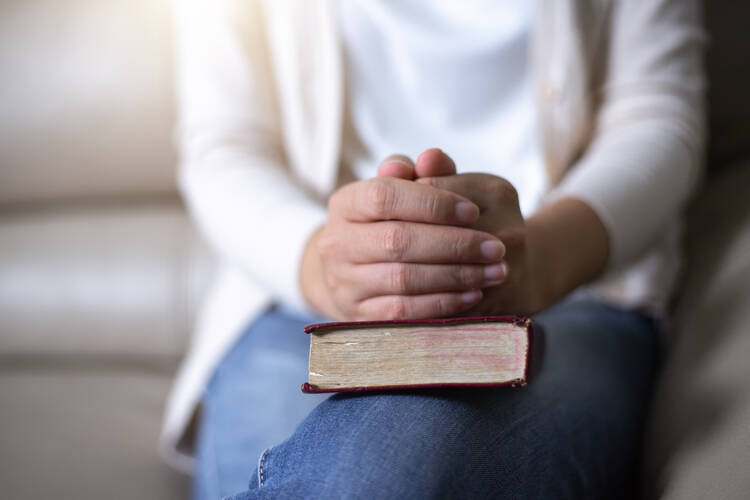The synthesis report of the October meeting of the Synod on Synodality called for further research and deliberation on whether women should be admitted to the diaconate. In a piece published online in America in March, Katie Owens Mulcahy urged the church to “[recognize] the gifts of diaconal women all around us—those who are preparing liturgies, going out to the margins, serving the poor and breathing life into the church.” She called readers to consider: “Imagine what could be possible if these gifts were empowered through ordination?” Her piece invited spirited debate from America’s readers.
The church needs women deacons so that a feminine understanding of the Gospels is heard at Mass. Women understand the Gospels somewhat differently than men do, and this other view is important. Women have always done the charitable work of deacons, so the primary reason for ordaining them in that capacity is to allow them into places that will only allow ordained ministers to serve.
“It is not right for us to neglect the word of God to serve at table” (Acts 6:2). That line applies to women as much as it does to men.
Lisa Weber
I take issue with the suggestion that the deacon’s role is currently limited to liturgy. Perhaps the deacon is seen more at liturgy than in outside ministry; however, the notion a deacon is involved in just liturgy is far from the norm.
First of all, the deacon has experienced an ontological rebirth through ordination, and most carry out their ministry in their secular professions. Additionally, there were many deacon popes in the early church, and they were involved in charity, administration, education, evangelization and every single aspect of church—not just liturgy.
Although it is unlikely that they would be elected as pope, the modern deacon continues the tradition of the earlier diaconate. The problem the modern church faces is that it has all but eliminated the diaconate as a permanent ministry and relegated it to a “stepping stone” ministry to the priesthood. As a result, there is a lot of catching up in the faithful’s mind to understand what deacons really do.
James Graham
With the decline of convents, there are few avenues of service for powerful and educated Catholic women other than domestic ones, and so many of us seek spiritual meaning elsewhere. A case could likely be made that certain virtues, like celibacy and the ability to be compassionate, come easier to women than to men. Just like people have preferences for different gendered doctors, it would logically be the same for spiritual mentors, since some topics are easier discussed without gender-related tension.
I find it interesting that many female saints over the centuries have not strictly adhered to traditional gender roles. No one seems to have had a problem canonizing them. There are precedents for female deacons. Just do it.
Jo Schaper
Christians are all called to serve in the ways the author has pointed out. I’m confused how this service is justification for holy orders and ordination to the diaconate, since this is a responsibility for all Christians.
As for the 35,000 refugees you mention whose spiritual needs are unmet, I worry that attributing that struggle to the lack of priests and deacons implies that the clergy should do all the work. This attitude is why the numbers for volunteers and lay ministers are reducing. This work belongs to all of us, lay and ordained alike. Look at Dorothy Day and the Catholic Workers. None were clergy, and they changed lives and filled souls as well as stomachs.
Women do preach—not within the liturgy, but in retreats, days of reflection, as Lenten speakers, in podcasts and YouTube. It is already being done, and they are really good. But is that justification for ordination?
The role of a deacon has never changed. It is to serve the bishop and God’s church, serve at the altar, and also fulfill all corporal works of mercy for all souls.
Chris Germak
Amen, Katie! I know many spirit-filled women in my life who are deeply invested in the church. For those who feel a call or would be open to a call to the diaconate, I am stirred at the thought of the extra strengthening they could receive through the outpouring of sacramental grace through ordination to the diaconate.
The Synod on Synodality’s synthesis document declares: “It is urgent to ensure that women can participate in decision-making processes and assume roles of responsibility in pastoral care and ministry.” As the father of two young daughters, I feel this same sense of urgency. And I hope they get to grow up in a church where they know their full dignity and gifts are honored because they see the church uplifting voices and perspectives like theirs!
Aaron Sinner








